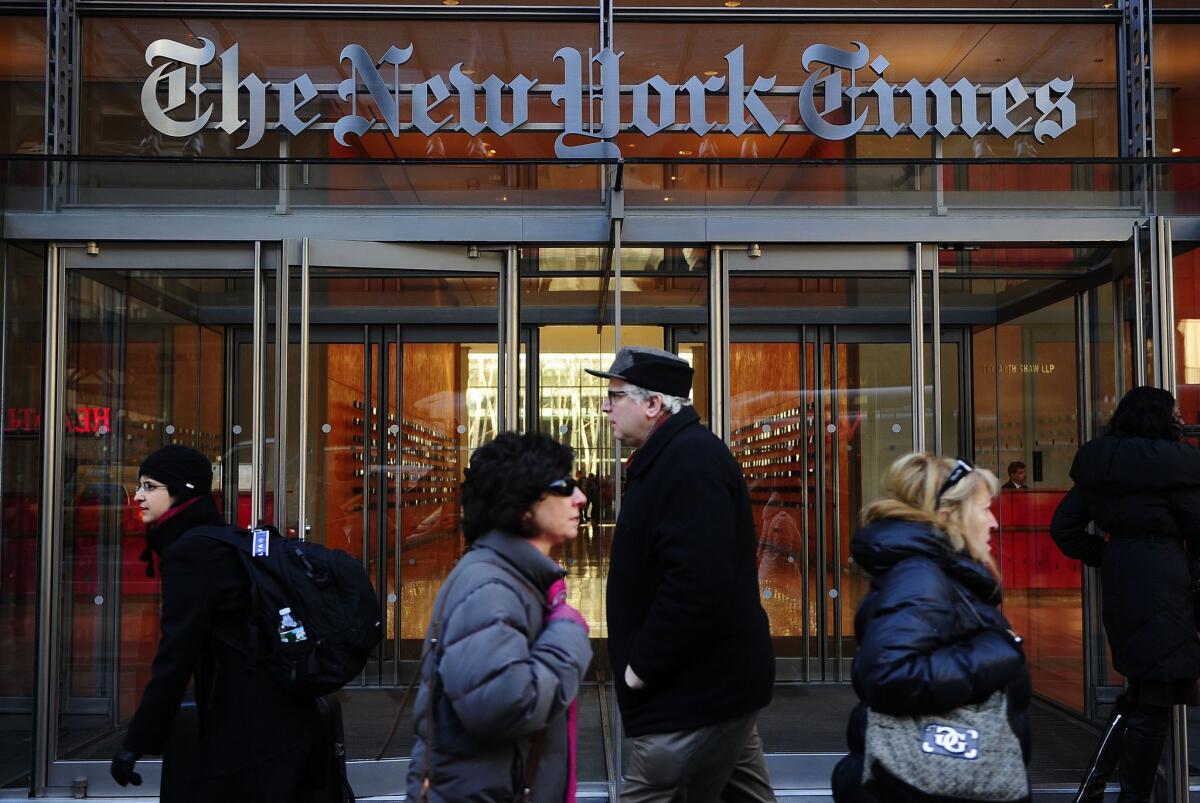New York Times stirs debate with call for ending U.S. ban on marijuana

- Share via
The editorial board of the New York Times has issued a dramatic call for the federal government to repeal its ban on marijuana, saying officials should leave the question of legalization up to state governments.
“It has been more than 40 years since Congress passed the current ban on marijuana, inflicting great harm on society just to prohibit a substance far less dangerous than alcohol,” said the opinion published on the cover of the paper’s Sunday Review section. “The federal government should repeal the ban on marijuana.”
The editorial goes on to cite the 658,000 arrests for marijuana possession in 2012, which far outnumber arrests for other, more dangerous drugs. “Even worse, the result is racist, falling disproportionately on young black men, ruining their lives and creating new generations of career criminals,” the editorial said.
The Times’ editorial received widespread attention from both sides of the issue.
The editorial comes after years of states across the country slowly loosening their own laws concerning use of marijuana, especially for medicinal purposes.
The most significant state action came in 2012, when voters in Colorado and Washington easily approved the legalization and regulation of the sale of marijuana, putting officials in those states at odds with federal law enforcement, which still treats the drug as illegal. Federal officials have cautiously allowed both states to proceed, leaving the issue at an uneasy detente that the New York Times editorial called unacceptable.
“We considered whether it would be best for Washington to hold back while the states continued experimenting with legalizing medicinal uses of marijuana, reducing penalties, or even simply legalizing all use. Nearly three-quarters of the states have done one of these,” the editorial said. “But that would leave their citizens vulnerable to the whims of whoever happens to be in the White House and chooses to enforce or not enforce the federal law.”
Citing health concerns about the effect of marijuana use on young people’s minds, the newspaper’s editorial board said it supports a prohibition on sales to those under 21 years of age.
“Creating systems for regulating manufacture, sale and marketing will be complex,” the editorial said. “But those problems are solvable, and would have long been dealt with had we as a nation not clung to the decision to make marijuana production and use a federal crime.”
Those who oppose legalized marijuana include Kevin Sabet, president of the policy group Smart Approaches to Marijuana.
“Do we really want another Big Tobacco industry that lives off addiction for profit?” Sabet told the Los Angeles Times.
“There are eight times as many liquor stores in poor neighborhoods in this country than upper-class, rich neighborhoods,” Sabet said, responding to the New York Times’ argument that repealing the marijuana ban would be good for civil rights. “The idea that this could help social justice is contrary to all of our experiences with alcohol and tobacco, two legalized drugs.”
Another opponent, Stuart Gitlow, president of the American Society of Addiction Medicine, said the editorial misstated several facts in making its argument for legalization.
“Their lead was that prohibition for alcohol failed, and yet when you looked back at the Prohibition, what you see is that per capita use of alcohol during Prohibition dropped more than 50%; as a result of that, alcohol-related deaths dropped considerably as well,” Gitlow said. “From a public-health standpoint, prohibition was an enormous public-health success.”
Gitlow also contested the New York Times’ claims that marijuana was no more dangerous than alcohol, saying that even light use could affect brain activity. Legalization could bring widespread use and, along with it, many more addicts, he said.
“We’ve gone over these past 30 to 40 years from about half the population smoking cigarettes to a much smaller figure,” Gitlow said. “It’s no longer considered reasonable to smoke in the supermarket or the workplace or on an airplane and it’s no longer legal in those circumstances, and as a result, illness and death have dropped considerably. Now the public wants to start that cycle again with a different drug they consider safer.”
But some officials and advocates in Washington state said legalization there, at least so far, has not been the end of the world.
“I think it’s early, obviously, but things seem to be going very well in Washington,” Alison Holcomb, an American Civil Liberties Union attorney, told the Los Angeles Times. Holcomb drafted Initiative 502, which legalized marijuana in Washington.
Holcomb said that in 2012, the year that measure passed, law enforcement officers made 5,531 marijuana-related arrests statewide. In 2013, that number dropped to 120.
“Some of the few data points we have show that in the first 10 days of having retail stores open, the state collected more than $318,000 in new tax revenues,” Holcomb said.
Seattle City Atty. Pete Holmes was second in line on the first day a marijuana dispensary there was open for legal sales recently. “Prohibition has failed to keep marijuana out of the hands of children,” Holmes told the Los Angeles Times. “It has made criminals wealthy and promoted violence and kept us in the dark about what rational regulation would look like.”
As to whether the Washington experiment has worked, Holmes said it was too soon to know. “I don’t think Seattle has enough of an experience with legal marijuana. There have been no problems with Cannabis City,” the one legal retail store in Seattle, he said. “We are trying to use the regulatory tools to stem the tide as we onramp more legal supply. We are insisting businesses follow city zoning laws.”
Twitter: @mattdpearce
More to Read
Sign up for Essential California
The most important California stories and recommendations in your inbox every morning.
You may occasionally receive promotional content from the Los Angeles Times.















